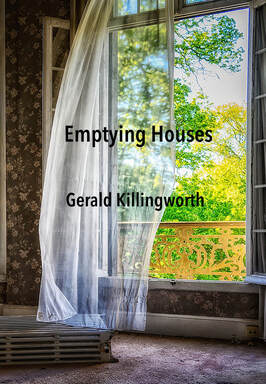Gerald Killingworth
EMPTYING HOUSES
|
"Gerald Killingworth's poems cover a wide range of topics, but the passage of time is an almost ever-present thread running through them, transporting the reader into history, often prehistory. Whether it be the natural world, human artefacts, or persons from the poet's past, the subjects of his poems are not only described in vivid detail, but in many poems they also speak directly and powerfully to us." — Jeremy Hilton, author of Fulmar's Wing.
|
Gerald Killingworth writes in a number of genres. His work regularly appears in poetry magazines and he is part of the workshop group which organizes the annual Tears in the Fence Poetry Festival. Gerald has published four novels, and has had plays produced on the London ‘fringe’. He gained a PhD on the Elizabethan writer Robert Greene and freely admits that the sixteenth century is the one he feels most at home in, perhaps because nobody would take any notice of his morris dancing.
Emptying Houses is the first published collection of Gerald's poems and includes poems written over his long career as a writer as well as recent work. "This is a tragicomedy of a collection, a subtle, understated blend of the light and the dark, of laugh-out-loud humour and touches of lump in the throat. I love the quirkiness of these poems, their wry look at the left-over fragments of language and life, the poignancy of the midden, the bitter-sweet moments left in an emptying house." -- Mandy Pannett
"Here Is a poet who worries at his world, and his past, like an archaeologist with a bone. He explicitly interrogates his own lexicon in order to unearth words and create Innovative poems on love, grief and loss, articulated with rare wit and passion. He suggests that aliens, treading Earth's grass in 'In Praise of Chlorophyll' might say, ‘We like the feel. / We can work with this. / Best not spoil it.’ " — Paul Hyland "Reading Killingworth’s poems is a bit like going on an archaeological dig: you never quite know what artefacts you are going to find but when you do find them they will surprise and enthral when they are held up to the light... ‘Sic Transit …’, shorthand for ‘thus passes the glory of the world’, in some ways echoes the opening poem ‘Emptying Houses’: in both poems, one about a house the other about an orchard, the owners have left and there is an air of expectation about what will happen next as well as a new appreciation of the “emptiness” left now that these places have been pared down to the bone.
Two other poems that caught my attention were ‘For Adrian’ and ‘Moon Sliver’. The former is a short poem about a small boy who is lost for a moment in a dream world of his own. Not a word is out of place and, for me, it is a real gem of a poem. The latter reads like the early arrival of a poem that begins to work its way into the subconscious overnight. Both poems, beautifully articulated, capture a fleeting moment and pin it to the page. Like John Clare’s ladybird poem, quoted at the beginning of the book, these poems are like “green grass…pearled with dew”, quiet and unobtrusive, awaiting discovery.' — Neil Leadbeater (reviewing in 'Write Out Loud, September 2022) |


